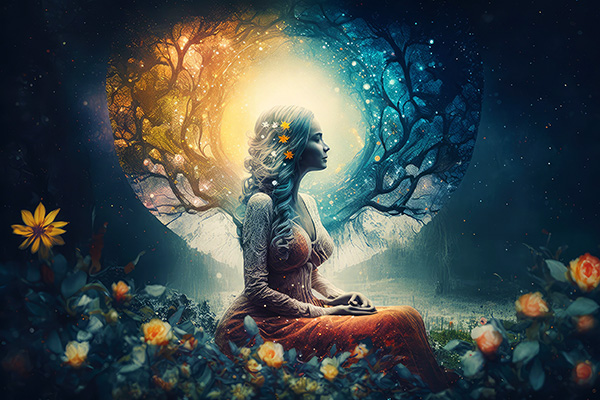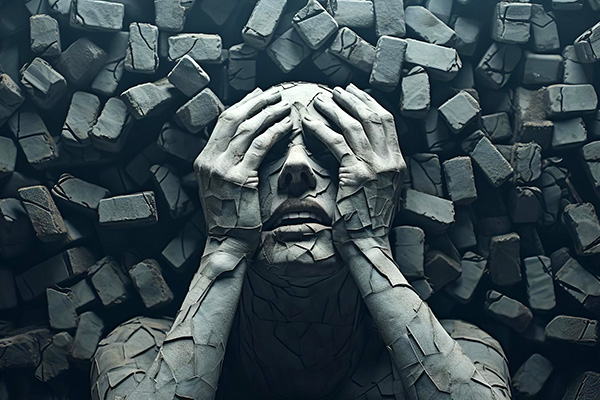spirituality
Breaking Through The Walls Of Disconnection
Have you felt like you have been talking to brick walls in your relationships lately? If so, rest assured that you are not alone! This issue has been coming up more and more in my readings. Many of my clients complain that they feel like they are not being heard or that they are simply not getting through to people.
Many factors contribute to this feeling. With so many of us addicted to our phones and social media, it’s become very easy to be physically present but mentally elsewhere. This often makes any attempt to have a meaningful conversation feel like it’s taking place in an echo chamber.
We are surrounded by so many distractions these days — constant notifications, endless scrolling, and click-bait videos that often prioritize drama and misinformation over truth and depth. These distractions pull our attention away from what really matters: meaningful connection, both with others and with ourselves.
Modern life is busy and demanding. People are constantly juggling many responsibilities and stresses, and often feel drained or overwhelmed. Many of us rarely have the emotional bandwidth to fully engage in meaningful conversations.
On top of that, people are less likely to have face-to-face conversations, or at least make a phone call, as most communication these days takes place via text messages and social media comments. As a result, there is a growing lack of communication skills and many misunderstandings occur because people have difficulty expressing themselves clearly or actively listening when they are actually having a conversation in person.
Spiritual Self-Care For The Sensitive Soul
 For those of us who are highly sensitive, including psychics, mediums, healers, and empaths, practicing consistent spiritual self-care is essential to maintaining our overall well-being.
For those of us who are highly sensitive, including psychics, mediums, healers, and empaths, practicing consistent spiritual self-care is essential to maintaining our overall well-being.
If you identify with this group and neglect the daily maintenance of your energetic health and spiritual hygiene, you leave yourself vulnerable. This can manifest as emotional, mental, and even physical health problems. The good news? You can safeguard your well-being with a dedicated spiritual self-care routine.
Spiritual self-care is about nurturing your inner being and maintaining healthy energy flow and balance. It includes practices that support your spiritual well-being and ensure that you stay grounded, centered, and connected to your higher self and the universe.
Regular spiritual self-care is also a matter of health. Research strongly supports the positive effects of spirituality on our overall health. Studies show that spiritually active people tend to live longer and enjoy better mental and physical health. For example, spirituality has been shown to correlate with a reduced risk of Alzheimer’s disease and cognitive decline.
Spirituality is associated with better mental health, including lower levels of depression and anxiety. Studies show that spiritual activities promote positive emotions such as hope, forgiveness, and gratitude, which contribute to resilience to stress and emotional challenges. It also promotes healthier lifestyles, including reduced substance use and better stress management.
Cultivating A Thriving Garden Of The Mind
 Your mind is like a fertile garden, constantly nurturing and cultivating the seeds of thought you plant each day. Every waking moment your ideas, beliefs, and perceptions take hold and gradually grow into the mental landscape that ultimately shapes your reality.
Your mind is like a fertile garden, constantly nurturing and cultivating the seeds of thought you plant each day. Every waking moment your ideas, beliefs, and perceptions take hold and gradually grow into the mental landscape that ultimately shapes your reality.
If you could take a walk through your “mind garden,” what would you find? Would you see sturdy, thriving trees of faith, hope, and positivity, their roots deeply nourishing the soil of your thoughts? Perhaps vibrant, radiant flowers of joy, abundance and well-being brightening the landscape?
Or would you find brittle branches of lost dreams and dry, withered remnants of unfulfilled hopes? Perhaps the creeping weeds of negativity and doubt smothering your true potential, casting shadows over your hopes and ideals?
I actually do this visualization sometimes as part of my morning meditation practice. I imagine walking through my inner garden, tending to my thoughts and beliefs, nurturing them with faith and positivity, fertilizing those that are flourishing, and pulling out the weeds of doubt, fear, or negativity that had somehow taken root and are no longer serving my highest good.
I also ask for divine guidance, calling on God, my guides and loved ones in spirit to help me recognize innate talents and growth opportunities that I might have overlooked or neglected. Perhaps there are hidden seeds within me that still need to be planted or nurtured. With intention, I also visualize planting new seeds of goodness, self-empowerment, and spiritual expansion.
The Common Cold As A Spiritual Detox
 It is quite common for people going through a period of spiritual growth or awakening to experience physical symptoms and illnesses such as colds, flu, or other infections.
It is quite common for people going through a period of spiritual growth or awakening to experience physical symptoms and illnesses such as colds, flu, or other infections.
Experiencing a nasty cold during your spiritual awakening is not only annoying, but also seems out of place and counterintuitive, especially when you’re supposed to be focusing on expanding your awareness, aligning your energy, and strengthening your connection to spirit and the divine.
However, it is important to know that the onset of physical symptoms, such as a cold or flu, usually has a profound spiritual significance. Although it may seem like an inconvenient interruption or a stroke of bad luck, this type of physical setback is often an essential part of our spiritual journey, as it is a sign that we are releasing old, toxic energies in order to heal and make room for new insights and energy.
I remember a pivotal moment in my own spiritual journey when I came down with a terrible cold. At the time, I was deeply immersed in exploring my Akashic Record and uncovering truths about certain past life traumas – particularly memories of being persecuted as a witch in a past life. This process brought up a flood of intense soul memories and ancient psychic wounds that had been waiting to be processed for several centuries!
One morning, after a particularly intense Akashic meditation the night before, I awoke with a scratchy throat, stuffy nose, body aches, and overwhelming fatigue. Frustrated, I wondered why I was getting sick now, just as I was breaking through to a deeper level of awareness and karmic healing. But as I surrendered to my body’s need for rest and recovery, I soon began to see the deeper purpose of my illness.
Start Living Your Best Life, Today!
 Many years ago, my work took me to the lavishly decorated penthouse of a client who was a retired physician. I remember being in awe of the magnificent collection of books that lined the walls of his home.
Many years ago, my work took me to the lavishly decorated penthouse of a client who was a retired physician. I remember being in awe of the magnificent collection of books that lined the walls of his home.
“Your book collection is truly amazing,” I remember saying as I entered his beautiful home.
“Well, I worked very hard all my life, and one of my little pleasures outside of work was to buy all the books I felt inspired to read. Unfortunately, because I was always so busy and worked very long hours, I had put off reading most of them. But I constantly reminded myself that one day, when I retire, I would read all these wonderful books,” he said. “Unfortunately, it is too late for that now.”
It was too late…because he had tragically gone blind from an illness.
I will never forget that heartbreaking moment, standing in that lovely room lined with some of the most wonderful works of literature ever published. To this day, it reminds me of the importance of doing the things that bring us joy while we can.
The moral of the story is that although the blind doctor did wonderful things for his patients and the medical profession, he didn’t take much time for his own joy and fulfillment in the present moment.
This is why we need to live our lives in the now! Too often we put off our passions because we think there’s always time. But living fully in the present allows us to appreciate each moment, which fuels joy and fulfillment.
Why You Should Be Dream Journaling
 When my grandfather was alive, we had many deep conversations about spirituality and the afterlife. During a few of those conversations, he also promised me that if there was a way for him to contact me from the other side after he passed away, he would do so.
When my grandfather was alive, we had many deep conversations about spirituality and the afterlife. During a few of those conversations, he also promised me that if there was a way for him to contact me from the other side after he passed away, he would do so.
True to his word, he kept his promise. Our connection has remained strong ever since, and he continues to guide me from the other side.
It’s been well over two decades since his death, but I still have visitation dreams and mediumistic experiences in which he communicates with me. I feel incredibly blessed for these encounters, and they have confirmed much of what I’ve always believed about the afterlife and the spirit realm.
Grandpa was one of the few people with whom I could openly discuss my psychic abilities, mediumship, and paranormal experiences growing up. He was incredibly open-minded and spiritually aware for a man of his generation and background.
Not only was he a firm believer in the existence of the soul beyond this life, but he was curious about all things mystical and supernatural. I vividly remember him telling me about an out-of-body experience he had, describing how he had seen his own body from above as he “floated”.
One of the most valuable lessons my grandfather taught me was the spiritual significance of our dreams. He grew up at a time when dreams were losing their mystical significance in society as scientists began to increasingly view the dream state purely through a psychological, biological, and neurological lens.

